- Clone
- Poly5095 (See other available formats)
- Regulatory Status
- RUO
- Other Names
- Interleukin-1 receptor antagonist, IL-1 inhibitor, IL-1 receptor antagonist protein (IRAP), IL-1 inhibitory activity, ILS, MG50, IL-1RN
- Isotype
- Rabbit Polyclonal IgG
- Ave. Rating
- Submit a Review
- Product Citations
- publications
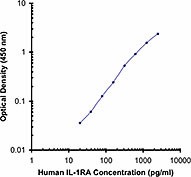
| Cat # | Size | Price | Quantity Check Availability | Save | ||
|---|---|---|---|---|---|---|
| 509502 | 500 µg | £257 | ||||
Interleukin-1 receptor antagonist (IL-1RA) is composed of three isoforms, one secreted (sIL-1Rα/IL-1Rα1), two intracellular (IL-1Rα2/IL-1Rα3) and produced by monocytes, tissue macrophages, Langerhans cells, dendritic cells, T and B cells, natural killer (NK) cells, large granular lymphocytes (LGL), vascular endothelium, smooth muscle, fibroblasts, thymic epithelia, astrocytes, microglia, glioma cells, keratinocytes, and chondrocytes. It is upregulated by IL-1β, IL-4, IL-6 and downregulated by glucocorticoids. The Poly5095 polyclonal antibody reacts with human interleukin-1 receptor antagonist (IL-1RA).
Product DetailsProduct Details
- Verified Reactivity
- Human
- Antibody Type
- Polyclonal
- Host Species
- Rabbit
- Immunogen
- Recombinant human IL-1 receptor antagonist
- Formulation
- Phosphate-buffered solution, pH 7.2, containing 0.09% sodium azide.
- Preparation
- The antibody was purified by affinity chromatography, and conjugated with biotin under optimal conditions.
- Concentration
- 0.5 mg/ml
- Storage & Handling
- The antibody solution should be stored undiluted between 2°C and 8°C. Do not freeze.
- Application
-
ELISA Detection
- Recommended Usage
-
Each lot of this antibody is quality control tested by ELISA assay. For ELISA capture applications, a concentration range of 0.5-2 µg/ml is recommended. It is recommended that the reagent be titrated for optimal performance for each application.
- Application Notes
-
ELISA Detection: The biotinylated Poly5095 antibody is useful as the detection antibody in a sandwich ELISA assay, when used in conjunction with the purified JK1RA-1 (Cat. No. 509902) antibody as the capture antibody.
This product may contain other non-IgG subtypes. - RRID
-
AB_315540 (BioLegend Cat. No. 509502)
Antigen Details
- Structure
- Cytokine; three isoforms, one secreted (sIL-1Rα/IL-1Rα1), two intracellular (IL-1Rα2/IL-1Rα3); 17 kD (Mammalian)
- Bioactivity
- Storage forms that are released upon cell death to limit inflammation caused by cell debris; competitive inhibitor of IL-1 receptor binding; antagonizes IL-1 activities without having agonist effects; does not initiate intracellular signal transduction pr
- Cell Sources
- Monocytes, tissue macrophages, Langerhans cells, dendritic cells, T and B cells, natural killer (NK) cells, large granular lymphocytes (LGL), vascular endothelium, smooth muscle, fibroblasts, thymic epithelia, astrocytes, microglia, glioma cells, keratino
- Cell Targets
- B cells, T cells, monocytes
- Receptors
- Type I IL-1R (CDw121a), Type II IL-1R (CDw121b)
- Biology Area
- Cell Biology, Immunology, Innate Immunity, Neuroinflammation, Neuroscience
- Molecular Family
- Cytokines/Chemokines
- Antigen References
-
1. Carter D, et al. 1990. Nature 344:633.
2. Chirivi R, et al. 1993. Cancer Res. 53:5051.
3. Holtkamp G, et al. 1999. Eur. J. Immunol. 29:215.
4. Kim J, et al. 2003. Gene Ther. 10:1543. - Regulation
- Upregulated by IL-1β, IL-4, IL-6; downregulated by glucocorticoids
- Gene ID
- 3557 View all products for this Gene ID
- UniProt
- View information about IL-1RA on UniProt.org
Related Pages & Pathways
Pages
Related FAQs
- How many biotin molecules are per antibody structure?
- We don't routinely measure the number of biotins with our antibody products but the number of biotin molecules range from 3-6 molecules per antibody.
Other Formats
View All IL-1RA Reagents Request Custom Conjugation| Description | Clone | Applications |
|---|---|---|
| Biotin anti-human IL-1 RA | Poly5095 | ELISA Detection |
Customers Also Purchased
Compare Data Across All Formats
This data display is provided for general comparisons between formats.
Your actual data may vary due to variations in samples, target cells, instruments and their settings, staining conditions, and other factors.
If you need assistance with selecting the best format contact our expert technical support team.
 Login / Register
Login / Register 









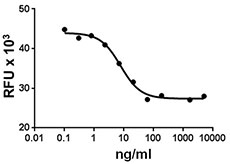
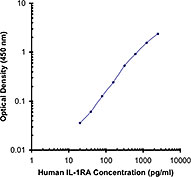
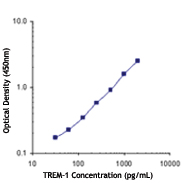
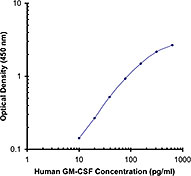
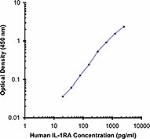



Follow Us